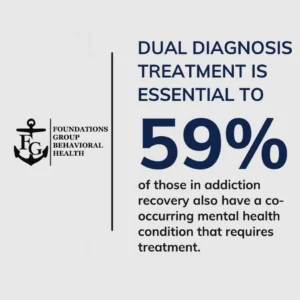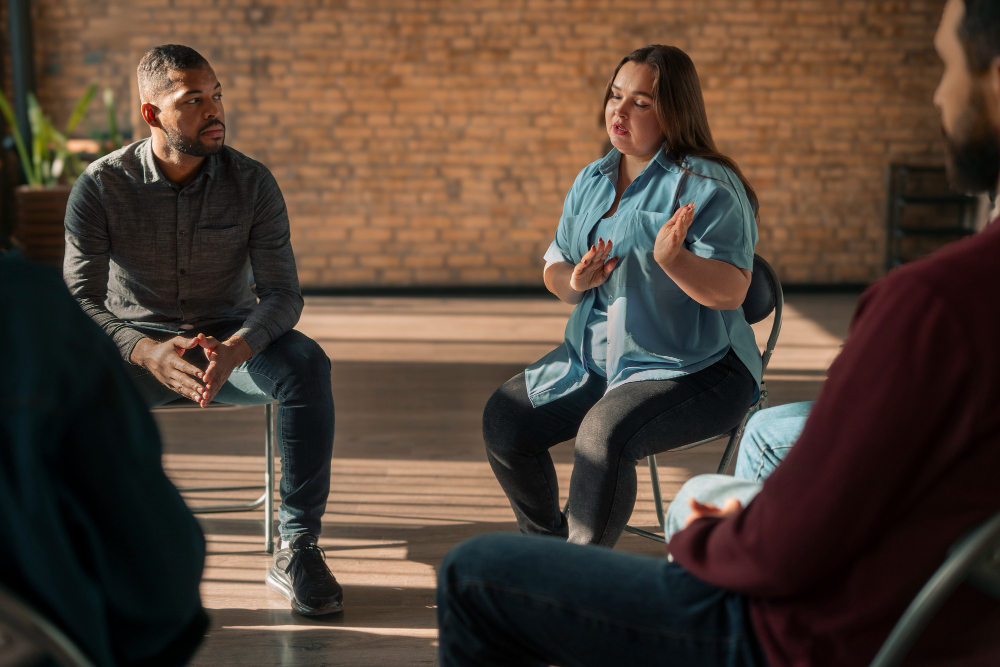When you’re newly sober, everything can feel louder. Lonelier. You may have expected some relief—but what you’re feeling is emptier than you imagined.
You’ve taken the substances away, but the anxiety stayed. The depression got louder. The ache in your chest didn’t go with the alcohol.
That’s where dual diagnosis treatment comes in.
At Foundations Group Behavioral Health in Cape Cod, MA, we work with people who are dealing with both substance use and mental health challenges. You don’t have to pick which one gets treated first—or carry the silent weight of one while trying to fix the other.
If you’re wondering how dual diagnosis treatment is different—and whether it’s what you actually need—this guide can help.
What Is Dual Diagnosis Treatment?
Dual diagnosis (also called co-occurring disorders treatment) is a type of care that supports both your mental health and substance use recovery at the same time.
It’s for people who are dealing with things like:
- Alcohol use and depression
- Anxiety and marijuana use
- PTSD and opioid addiction
- Bipolar disorder and stimulant use
- Trauma-related eating struggles and alcohol
Instead of treating mental health and substance use as separate silos, dual diagnosis care recognizes that they interact, feed into each other, and must be treated together.
Why Is This Approach So Important?
Here’s what often happens in traditional addiction treatment:
You get support for staying sober—but not for the reasons you drank.
You stop using—but no one helps you sit with the panic, grief, or numbness that returns.
You hear “relapse prevention,” but no one talks about the way your thoughts spiral at night.
Dual diagnosis treatment sees the full picture.
It’s not just about getting sober. It’s about giving you the tools and therapeutic support to feel emotionally safe and mentally steady as you build a life without substances.
Because healing isn’t just about stopping something—it’s about finding something worth staying for.
What Makes Dual Diagnosis Treatment Different?
At Foundations Group Behavioral Health, we integrate mental health care and substance use recovery through:
Mental Health Support
- Clinical evaluations to identify mood disorders, trauma history, anxiety, and more
- Therapy designed for people with co-occurring struggles (not one-size-fits-all)
- Psychiatry and medication management when appropriate
Recovery-Focused Therapy
- Individual therapy with clinicians trained in both fields
- Group therapy that includes both mental health and addiction themes
- Trauma-informed care that respects your pace
Ongoing Emotional Support
- Emotional regulation skills
- Relapse prevention built around mental health triggers
- Safe spaces to talk about isolation, shame, fear, and hopelessness
In early recovery, mental health can feel like the “elephant in the room.” Dual diagnosis care makes it safe to name it—and treat it.
Who Needs Dual Diagnosis Treatment?
You might benefit from dual diagnosis care if:
- You’ve struggled with anxiety, depression, PTSD, or mood swings—even before using
- Your emotions feel unmanageable when you try to stay sober
- You’ve tried recovery before, but mental health symptoms pulled you back in
- You feel like nobody sees what’s going on underneath the surface
In short: if you’ve ever felt like traditional addiction care didn’t fully fit you, this might be the missing piece.
Does This Exist Near Me?
Yes. If you’re in Cape Cod, Barnstable County, or nearby areas like Falmouth, MA, Foundations Group Behavioral Health offers compassionate, integrated care that meets you where you are.
👉 Looking for dual diagnosis treatment in Barnstable County, MA?
👉 Live in Falmouth, MA and need support for co-occurring disorders?
FAQ: Common Questions About Dual Diagnosis Treatment
What if I don’t know whether I have a mental health disorder?
That’s completely okay. Many people don’t have a diagnosis before starting care. In dual diagnosis programs, you’ll receive a comprehensive assessment to understand what’s happening—and how best to support you. You don’t have to have it all figured out before you begin.
Is dual diagnosis only for “serious” mental illness?
Not at all. While it does help people with complex conditions like bipolar disorder or PTSD, it’s also for those struggling with anxiety, trauma, grief, or depression that hasn’t been formally diagnosed. Emotional pain doesn’t have to meet a clinical threshold to deserve care.
What’s the difference between dual diagnosis and regular outpatient treatment?
Regular outpatient programs might focus only on addiction. Dual diagnosis care, on the other hand, is built to support both addiction and mental health struggles together—using staff and therapies trained for both. The care is more integrated, more flexible, and more attuned to the emotional realities of recovery.
Can I still attend if I’m already on medication?
Yes. In fact, many clients in dual diagnosis care take psychiatric medications as part of their stability plan. You’ll work with clinicians who understand how to safely manage meds in the context of recovery.
What if I already tried treatment and it didn’t work?
That doesn’t mean you didn’t work. It might mean you didn’t get the right type of care. If past programs didn’t address your anxiety, trauma, or emotional spirals, dual diagnosis care could be the more complete support system you’ve been needing.
Why Foundations Group?
Our team on Cape Cod has helped hundreds of clients move through the emotional tangle of early recovery. We believe:
- You’re not “too complicated”
- Sobriety without emotional support isn’t enough
- Feeling lonely, lost, or scared is part of healing—not a sign of failure
Dual diagnosis treatment is about making space for all of that. It’s care that sees you—not just your symptoms.
Take the Next Step
📞 Call 888-685-9730 or visit our dual diagnosis treatment program page to learn more about support in Cape Cod, MA.
You don’t have to be “ready.”
You don’t have to be strong.
You just have to be you—and willing to let someone walk beside you for a while.









